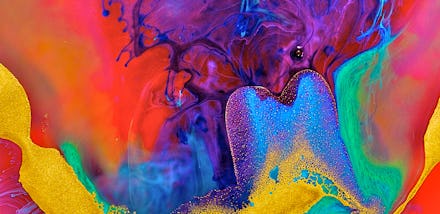Norwegian Doctors Say Psychedelic Drugs Are as Safe as "Riding a Bike or Playing Soccer"

Two researchers from Oslo believe psychedelic drugs are less dangerous than alcohol — and want to give them away for free.
Teri Krebs and husband Pål-Ørjan Johansen are the founders of EmmaSofia, a nonprofit organization trying to reform legal policies on MDMA and psychedelics. With a $30,000 crowd-funding campaign in the works, the husband and wife team hope to give more people access to psilocybin (magic mushrooms) and MDMA for medical and scientific use.
"Psychedelics often induce profound experiences while at the same time having a safety profile comparable to many activities of daily life, such as riding a bicycle or playing soccer," Johansen said in a press release for the couple's letter in the Lancet Psychiatry. "It is important to take a statistical perspective on risk, rather than focusing on anecdotes."
The two examples of daily activities may not instill the most confidence, since soccer injuries can lead to brain damage and bicyclists are at the mercy of crappy drivers. But the point remains: Soccer and biking are relatively harmless, while alcohol, the most commonly used and abused drug, is tied to 2.5 million deaths each year.
On the other hand, psychedelic drugs are shown to help treat dependence and aid patients suffering from diseases like Parkinson's. And they don't carry the psychological risks often associated with mind-altering substances.
Psychedelics as treatment: There have been earlier studies using psilocybin to help with overcoming past trauma, and the substance might even be useful in treating depression if more conventional means aren't working.
In fact, according to the couple's letter, psychedelics are some of the cleaner mind-altering substances you can put in your body.
"Based on extensive human experience, it is generally acknowledged that psychedelics do not elicit addiction or compulsive use and that there is little evidence for an association between psychedelic use and birth defects, chromosome damage, lasting mental illness, or toxic effects to the brain or other organs," the letter said. "Although psychedelics can induce temporary confusion and emotional turmoil, hospitalizations and serious injuries are extremely rare."
Isn't this illegal? While recreational use of psychedelics is illegal in most countries, using psychedelic substances in a research and medical capacity is still fair game.
"There has never been a ban on research with psychedelics," Krebs wrote in a Reddit AMA in March. "Today, over a thousand volunteers and patients have received psychoactive doses of MDMA or psilocybin in clinical trials in the US and other countries (Switzerland, UK, Spain, Israel, etc)."
Right now, EmmaSofia's Indiegogo campaign, which focuses on increasing those medical uses, is at the halfway point, with just under two months left for funding. If Krebs and Johansen manage to get EmmaSofia off the ground, it could mean a major switch in how people suffering from a wide range of diseases treat themselves, a move away from traditional western medical approaches — and, probably, a spike in blacklight posters and Grateful Dead reprints.